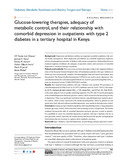| dc.description.abstract | BACKGROUND:
Depression and diabetes mellitus are important comorbid conditions with serious health consequences. When depression and diabetes are comorbid, depression negatively affects self-management activities of diabetes with serious consequences. Relationship between treatment regimens of diabetes, the adequacy of glycemic control, and occurrence of comorbid depression is not known among our patients.
PATIENTS AND METHODS:
This was a cross-sectional descriptive study at the outpatient diabetes clinic of the Kenyatta National Hospital where 220 ambulatory patients with type 2 diabetes on follow-up were systematically sampled. Sociodemographic data and clinical information were documented. The Patient Health Questionnaire-9 (PHQ-9) was used to assess depression. Ethylenediaminetetraacetic acid-anticoagulated blood was used for glycated hemoglobin (HbA1C) assay on automated system, COBAS INTEGRA machine.
RESULTS:
Two hundred twenty patients with type 2 diabetes were enrolled. The prevalence of comorbid depression by PHQ-9 was 32.3% (95% confidence interval: 26.4%-38.6%). The majority, 69.5%, had poor glycemic control, HbA1C >7.0%, mean HbA1C was 8.9%±2.4%. Half, 50.4%, of the study subjects were on insulin-containing regimens. Over 8% (84.5%) of the participants with comorbid depression had poor glycemic control, which worsened with increasing severity of depression. There was significant correlation between comorbid depression and poor glycemic control, which is more consistent in the insulin-treated patients. However, patients on oral agents only, both with and without comorbid depression, were similar in their glycemic control.
CONCLUSION:
Among our type 2 diabetic population with comorbid depression, a large proportion had poor glycemic control, which worsened with increasing severity of depression. The insulin treatment increased the odds of comorbid depression and poor glycemic control in patients. It is justifiable to screen for comorbid depression in patients with type 2 diabetes who are in poor glycemic control, especially the insulin-treated, and then provide specific and appropriate interventions that are necessary to optimize their metabolic outcomes. | en_US |



